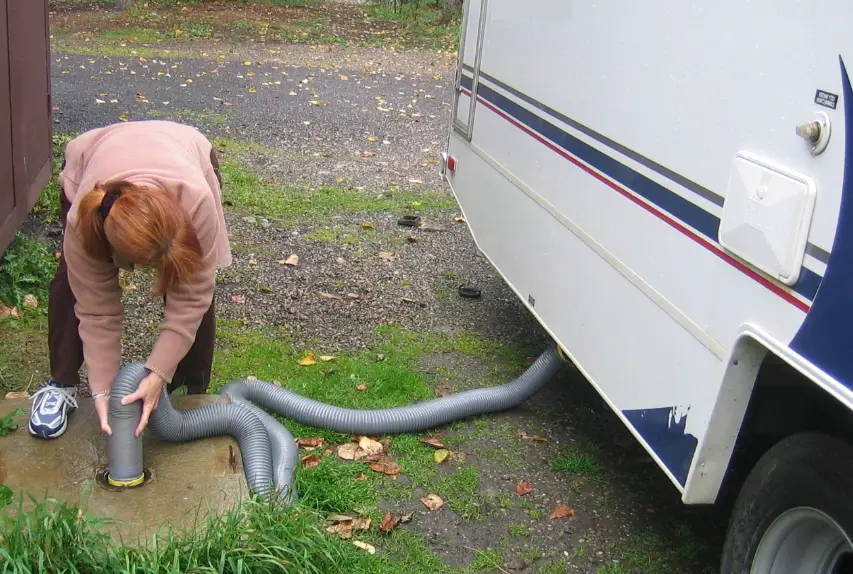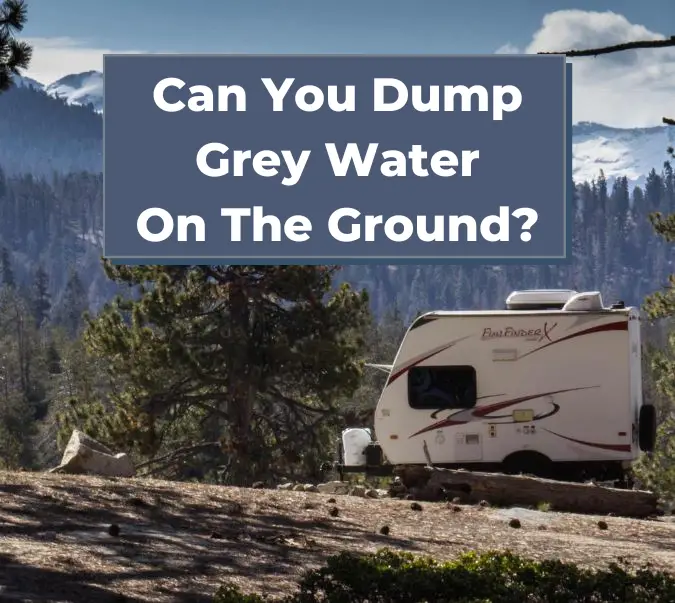When it comes to camping, one of the most important things to consider is how to properly dispose of wastewater. While dumping black water (sewage) on the ground is strictly prohibited, the rules around dumping grey water (wastewater from sinks, showers, and washing machines) can be a bit more complicated. So many campers wonder: can you dump grey water on the ground? The answer is maybe, and depends on where you are camping and the specific regulations in place.
In some areas, dumping grey water on the ground is strictly prohibited and can result in fines or other penalties. However, in other areas, it may be allowed under certain conditions.
Even if it’s legal to dump gray water in some places, it’s crucial to think about how it could affect the environment. Large amounts of gray water can lead to erosion and damage local ecosystems. That’s why many campers opt for portable gray water tanks or other ways to dispose of waste that are less harmful to nature.
What is Grey Water?
Gray water refers to wastewater from non-toilet plumbing fixtures such as sinks, showers, and washing machines. It differs from blackwater, which comes from toilets and contains human waste. Gray water is usually less polluted than blackwater and can be repurposed for things like watering plants or flushing toilets.
The contents of gray water can vary but may include soap, shampoo, food particles, and dirt. It generally doesn’t have high levels of harmful chemicals or pathogens, making it less damaging to the environment than black water.
Grey water can be divided into two categories:
- Kitchen grey water: This type of grey water comes from the kitchen sink and dishwasher and contains food particles, grease, and oil.
- Bathroom grey water: This type of grey water comes from the shower, sink, and washing machine and contains soap, shampoo, and dirt.
While grey water is less harmful than black water, it is still important to handle it properly to prevent contamination of the environment. Dumping grey water on the ground can cause pollution and harm plants and wildlife. It is important to follow local laws and regulations when disposing of gray water to protect the environment and public health.

Legal Considerations
State and Local Regulations
It is important to note that in most states, it is illegal to dump grey water on the ground, even when boondocking.
Most of the laws are written for homeowners, and they define how many gallons of water can be dispersed at a time and how it is used.
Private property dumping is limited mainly to watering lawns and flower beds.
Before dumping grey water on the ground, it is essential to check the state and local laws to avoid any legal issues.
Some states that specifically prohibit dumping gray water on the ground are California, Colorado, and Idaho.
Other states like Arizona and Montana are very specific about what kind of grey water can be dumped (such as bathing water only).
It’s best to check at the park level, and then even at your local city or county level as well before dumping RV gray water on the ground.
Bureau Of Land Management (BLM) Regulations
The Bureau of Land Management does not prohibit dumping grey water out on the ground, which they refer to as “wash water” in their rule.
In this case that would mean water that was used for washing purposes such as showering, brushing your teeth, washing your hands, or washing dishes for example.
National Park Service Regulations
The National Park Service does not allow dumping of grey water on the ground, and per it’s rules it specifically states that any drained refuse from a trailer or other vehicle must be done in facilities provided for that purpose (i.e. a dumping station).
U.S. Forest Service Regulations
The U.S. Forest Service prohibits the dumping of grey water on the ground, but some campers have been allowed to after getting permission from a forest ranger. Always ask permission before you dump!
U.S. Fish and Wildlife Service
The U.S. Fish and Wildlife Service’s rules are a little bit unclear, as they specifically state that dumping of “refuse sewage” is not allowed, but they don’t specify what that is.
It’s best to use a “better safe than sorry” approach here and assume that the term “refuse sewage” applies to RV gray water.
Bureau of Reclamation Regulations
The Bureau of Reclamation is an agency that’s focused on bodies of water, like rivers and lakes. Naturally, they also do not allow dumping of any type of RV waste water on the ground.
Army Corps Of Engineers Regulations
The Army Corps of Engineers also prohibits the dumping of waste water (grey and/or black) on the ground in its rules.
Environmental Impact
Negative Effects On Soil
Gray water containing cleaning soaps, shampoos, and chemical-based foods can harm the environment. The damage may not be immediately apparent, but over time it can make the area unhealthy. Some of the ways gray water can affect soil include:
- The inability to absorb water as well due to the infiltration of substances like fats and oils
- Dryness due to the introduction of phosphates or salts
- Changes in the PH-level of the soil due to various chemicals
Increased Algae Growth
Dumping gray water into bodies of water can cause an increase in algae growth. This is because gray water often contains nutrients like nitrogen and phosphorus that are essential for plant growth. When these nutrients are introduced in large quantities, they can cause an overgrowth of algae and other aquatic plants. This can reduce oxygen levels in the water and harm fish and other aquatic life.
It is important to note that dumping gray water into bodies of water is illegal in many areas. Always check local laws and regulations before dumping gray water.

Alternative Disposal Methods
Using a Grey Water System
One of the most eco-friendly methods of disposing of grey water is by using a gray water system. These systems collect grey water from your RV and filter it before it is reused for flushing toilets or watering plants. This method not only reduces water waste but also helps to conserve water. Grey water systems can be installed in your RV or can be purchased as portable units.
Dumping at a Dump Station
If you are camping at a location that has an RV dump station, this is a great option for disposing of your gray water. Dump stations are equipped with facilities that allow you to empty your grey water tank without causing any harm to the environment. It is important to note that not all dump stations allow the dumping of grey water, so it is essential to check with the campground or RV park before using a dump station.
Disposing At A Campground
Many campgrounds and RV parks have designated areas for grey water disposal. These areas are designed to allow for the safe and eco-friendly disposal of gray water. It is important to follow the guidelines provided by the campground or RV park to ensure that you are disposing of your grey water safely and responsibly.
Overall, there are several alternative methods for disposing of grey water that are safe and eco-friendly. By using a grey water system, dumping at a dump station or disposing at a campground, you can reduce your impact on the environment and ensure that you are camping responsibly.
Other Ways You Can Help
When possible, use biodegradable soap and phosphate-free products for bathing, hand-washing, and dish washing when camping.
This won’t make your gray water perfect, but it will reduce the impact it has on the environment when you dump it.
Conclusion
After a lot of research, it is clear that dumping grey water on the ground is not always legal or environmentally responsible. It’s important to check local and state laws and regulations before dumping grey water on the ground. Even if it is legal, it is still important to consider the environmental impact and potential harm to plants and wildlife.
There are alternatives to dumping grey water on the ground, such as using a portable holding tank or finding a designated dumping station. It is also important to properly dispose of any solids and chemicals in the grey water, as they can be harmful to the environment.
When camping or RVing, it is important to be a responsible and respectful visitor to the natural environment. By following the rules and regulations, and being mindful of the impact of our actions, we can help preserve and protect our natural resources for future generations.
Check out our other helpful RV guides while you’re here:

